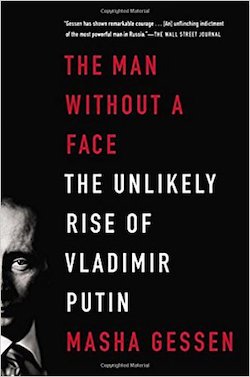The autocrat and the dilettante

We had some identification problems at last night’s Reading Through It book club at Third Place Books Seward Park. Someone would be talking about “him” as a bully, or an ideological vacuum, or an agent of chaos. We’d discuss “his” failure to behave as a normal leader, and his inability to consider his own nation as a member of an international community.
And then someone else would interrupt with a question for the sake of clarification: this “him” you’re referring to — are you talking about Vladimir Putin, or are you talking about Donald Trump?
The discussion of Masha Gessen’s book The Man Without a Face: The Unlikely Rise of Vladimir Putin felt mildly unfocused, largely in part because the book was published years before Donald Trump was elected president. So because Trump doesn’t appear in the book, readers try to see Trump everywhere in the book.
And to be clear: the two men do have many qualities in common. Putin and Trump both love ostentatious wealth and they’re openly greedy. They generate power out of chaos. They don’t seem to stand for anything. They could broadly both be defined as bullies.
But you can’t linger on the similarities for too long before the differences make themselves plain: Putin is a disciplined man who is well-versed in bureaucracy. Putin has almost certainly had his enemies killed, while Trump is more likely to send nasty faxes to his foes. Putin came up through the KGB. Trump came up through reality television. They may share methods and a moral baselessness, but the truth is that Putin is better equipped for an autocratic style of leadership than Trump ever will be. One plays at being a tough guy; the other is a tough guy. In her recent appearance on The Ezra Klein Show, Gessen plainly explained the distance between Putin and Trump. The podcast is definitely worth a listen:
Some in the book club disagreed with me, but I found some comfort in The Man Without a Face. The left is currently overrun with conspiracy theories depicting Trump as an unwitting pawn in a complex chess game, with Putin the grandmaster confounding the American people at every step of the way. Gessen’s portrait puts the lie to that story of Putin as an omnipotent and omniscient overlord. Instead, he makes as much chaos as possible, and then he profits from the aftermath.
Extrapolating from Gessen’s portrayal of Putin, it’s easy to imagine Russia as a major player in the 2016 presidential election. Putin is an expert at controlling and extinguishing the flow of information, and he likely wanted to maximize the frustration and divisiveness of an already-anxious electorate. His agents undoubtedly tried to foment as much unrest as they could.
But it’s highly unlikely that Putin expected Trump to win the presidency, and it’s very likely that now Trump is president, Putin is improvising and trying to make as much trouble as possible. In this scenario, Trump is still an unwitting pawn, but Putin is just as flabbergasted and confused as the rest of us as he tries to navigate this new world he unwittingly helped to create.
Gessen’s portrayal of Putin supports this thesis. The story she tells in Man Without a Face is a remarkable one, deftly laid out with a confidence that encourages readers to connect their own dots using available evidence. And the portrait of Putin is by no means flattering: he is a mean, greedy, monstrous man who has ordered assassinations and allowed innocent people to die. But he is, at the core, a man — as human as you or I, and just as prone to mistakes, and just as mortal. He has flaws and blind spots and weaknesses, and they will eventually lay him low. In the end, we’re all betrayed by our humanity.
The next Reading Through It meets at Third Place Books Seward Park on Wednesday, July 5th. We’ll be discussing Jane Meyer’s Dark Money: The Hidden History of the Billionaires Behind the Rise of the Radical Right. It's available at Third Place for 20 percent off for the rest of the month; I hope you’ll join us for our discussion. You can also join the Reading Through It Facebook group for more details and discussion.